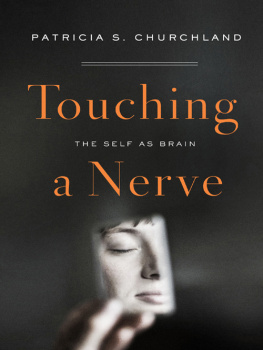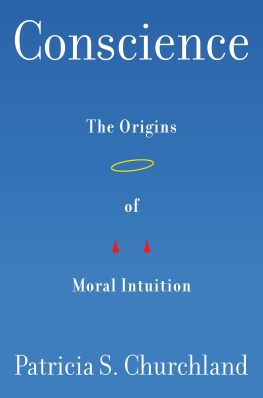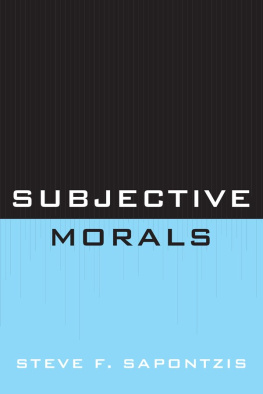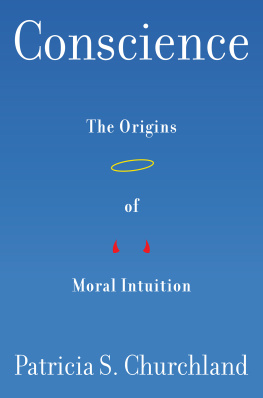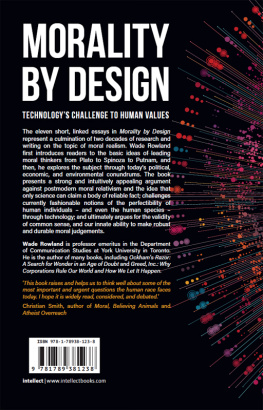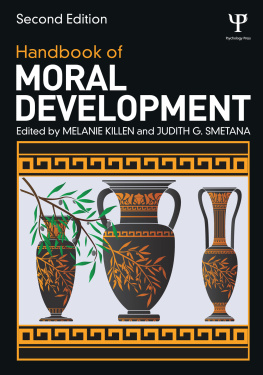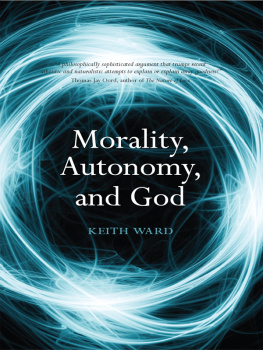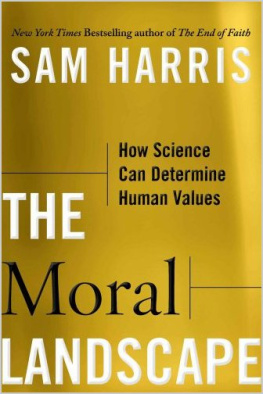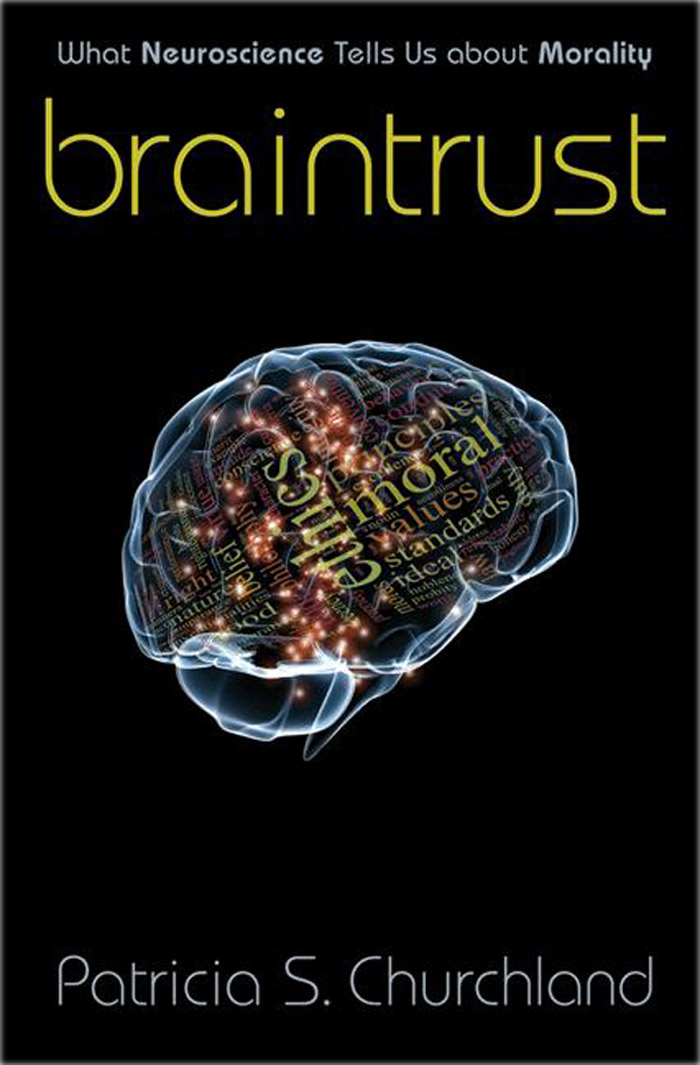braintrust
braintrust
What Neuroscience Tells Us about Morality
Patricia S. Churchland
Princeton University Press Princeton and Oxford
Copyright 2011 by Princeton University Press
Published by Princeton University Press, 41 William Street,
Princeton, New Jersey 08540
In the United Kingdom: Princeton University Press, 6 Oxford Street,
Woodstock, Oxfordshire OX20 1TW
press.princeton.edu
All Rights Reserved
Jacket illustration: Brain Sebastian Kaulitzki/Shutterstock
LIBRARY OF CONGRESS CATALOGING-IN-PUBLICATION DATA
Churchland, Patricia Smith.
Braintrust : what neuroscience tells us about morality / Patricia S.
Churchland.
p. ; cm.
What neuroscience tells us about morality
Includes bibliographical references and index.
ISBN 978-0-691-13703-2 (hardcover : alk. paper)
1. Ethics. 2. Neurobiology.
I. Title. II. Title: What neuroscience tells us about morality.
[DNLM: 1. Neuropsychology. 2. Morals. 3. Neurosciencesmethods.
4. Philosophy. 5. Social Behavior. WL 103.5]
QP430.C58 2011
612.8dc22 2010043584
British Library Cataloging-in-Publication Data is available
This book has been composed in Electra
Printed on acid-free paper.
Printed in the United States of America
1 3 5 7 9 10 8 6 4 2
Its a vice to trust everyone, and equally a vice to trust no one.
Seneca
This is our mammalian conflict: what to give to others and what to keep for yourself. Treading that line, keeping others in check and being kept in check by them, is what we call morality.
Ian McEwan, Eternal Love
Contents
Illustrations
braintrust
Introduction
Trial by ordeal seemed to me, as I learned about it in school, ridiculously unfair. How could it have endured as an institution in Europe for hundreds of years? The central idea was simple: with Gods intervention, innocence would plainly reveal itself, as the accused thief sank to the bottom of the pond, or the accused adulterer remained unburned by the red hot poker placed in his hand. Only the guilty would drown or burn. (For witches, the ordeal was less forgiving: if the accused witch drowned she was presumed innocent; if she bobbed to the surface, she was guilty, whereupon she was hauled off to a waiting fire.) With time on our hands, my friend and I concocted a plan. She would falsely accuse me of stealing her purse, and then I would lay my hand on the stove and see whether it burned. We fully expected it would burn, and it did. So if the test was that obvious, how could people have trusted to trial by ordeal as a system of justice?
From the medieval clerics, the answer would have been that our test was frivolous, and that God would not deign to intervene with a miracle for the benefit of kids fooling around. That answer seemed to us a bit cooked up. What is the evidence God ever intervened on behalf of the wrongly accused? A further difficulty concerned nonbelievers, such as those not yet reached by missionaries, or... maybe me? Still, this answer alerted us to the matter of metaphysical (or as we said then, otherworldly) beliefs in moral practices, along with the realization that what seemed to us obvious about fairness in determining guilt might not be obvious after all.
My history teacher tried to put the medieval practice in context, aiming to soften slightly our sense of superiority over our medieval ancestors: in trial by ordeal, the guilty were more likely to confess, since they believed God would not intervene on their behalf, whereas the innocent, convinced that God would help out, were prepared to go to trial. So the system might work pretty well for getting confessions from the guilty, even if it did poorly for protecting the innocent. This answer alerted us to the presence of pragmatics in moral practices, which struck us as a little less lofty than we had been led to expect. How hideously unfair if you were innocent and did go to trial. I could visualize myself, bound by ropes, drowning in a river after being accused of witchcraft by my piano teacher.
So what is it to be fair? How do we know what to count as fair? Why do we regard trial by ordeal as wrong? Thus opens the door into the vast tangled forest of questions about right and wrong, good and evil, virtues and vices. For most of my adult life as a philosopher, I shied away from plunging unreservedly into these sorts of questions about morality. This was largely because I could not see a systematic way through that tangled forest, and because a lot of contemporary moral philosophy, though venerated in academic halls, was completely untethered to the hard and fast; that is, it had no strong connection to evolution or to the brain, and hence was in peril of floating on a sea of mere, albeit confident, opinion. And no doubt the medieval clerics were every bit as confident.
It did seem that likely Aristotle, Hume, and Darwin were right: we are social by nature. But what does that actually mean in terms of our brains and our genes? To make progress beyond the broad hunches about our nature, we need something solid to attach the claim to. Without relevant, real data from evolutionary biology, neuroscience, and genetics, I could not see how to tether ideas about our nature to the hard and fast.
Despite being flummoxed, I began to appreciate that recent developments in the biological sciences allow us to see through the tangle, to begin to discern pathways revealed by new data. The phenomenon of moral values, hitherto so puzzling, is now less so. Not entirely clear, just less puzzling. By drawing on converging new data from neuroscience, evolutionary biology, experimental psychology, and genetics, and given a philosophical framework consilient with those data, we can now meaningfully approach the question of where values come from.
The wealth of data can easily swamp us, but the main story line can be set out in a fairly straightforward way. My aim here is to explain what is probably true about our social nature, and what that involves in terms of the neural platform for moral behavior. As will become plain, the platform is only the platform; it is not the whole story of human moral values. Social practices, and culture more generally, are not my focus here, although they are, of course, hugely important in the values people live by. Additionally, particular moral dilemmas, such as when a war is a just war, or whether inheritance taxes are fair, are not the focus here.
Although remarks of a general sort concerning our nature often fall on receptive ears, those same ears may become rather deaf when the details of brain circuitry begin to be discussed. When we speak of the possibility of linking large-scale questions about our mind with developments in the neurosciences, there are those who are wont to wag their fingers and warn us about the perils of scientism. That means, so far as I can tell, the offense of taking science into places where allegedly it has no business, of being in the grip of the grand delusion that science can explain everything, do everything. Scientism, as I have been duly wagged, is overreaching.
The complaint that a scientific approach to understanding morality commits the sin of scientism does really exaggerate what science is up to, since the scientific enterprise does not aim to displace the arts or the humanities. Shakespeare and Mozart and Caravaggio are not in competition with protein kinases and micro RNA. On the other hand, it is true that philosophical claims about the nature of things, such as moral intuition, are vulnerable. Here, philosophy and science are working the same ground, and evidence should trump armchair reflection. In the present case, the claim is not that science will wade in and tell us for every dilemma what


